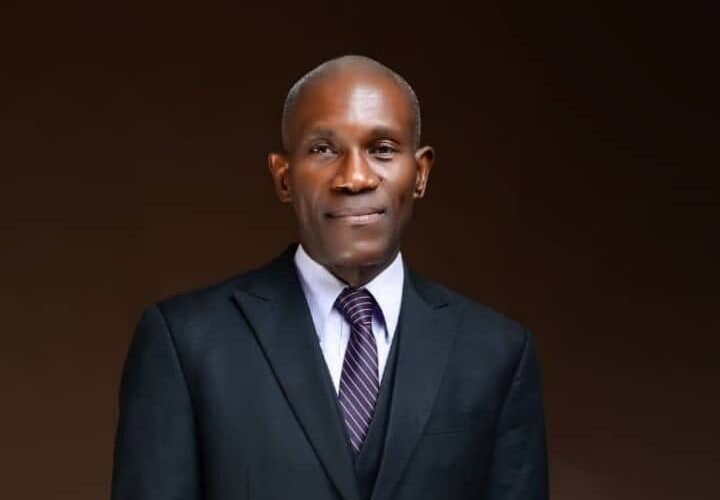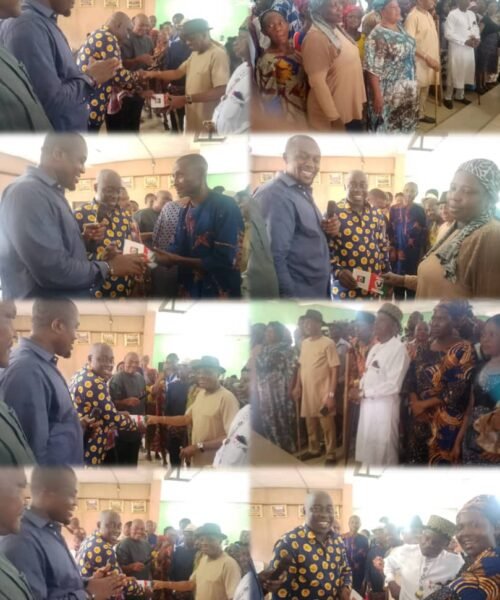*A Gentle Clarification on Governance, Facts & Responsibility
A Response to “Exposing the N32.7bn…” by EKWEDIKE
My dear brother, first let me congratulate you on your latest outing. Your passion for public accountability is admirable, and no one in Government House—absolutely no one—desires to silence you. On the contrary, voices like yours form part of the democratic oxygen every government needs.
Please be assured: your activities are classified as service to society, not sabotage.
And for that, you deserve respect.
Governor Alex Chioma Otti OFR fully understands and honours your civic engagement. He has never demanded silence from any citizen, nor has he attempted to suppress your contributions. You are free, as you should be, to ask questions.
For my part, I only have one sworn duty:
Wherever misinformation or disinformation appears, I must quietly scan it, identify it, and respond with fact-based, evidence-based, context-grounded explanations.
I encourage you to remain calm and read this in the same spirit of respect with which it is written.
I hope—since you’ve vowed never to react—you will keep that vow; its silence helps me remain exactly where you expect me to be.
Now, to business.
Revisiting the Premise: Revenue Is Not the Same as Cash Flow
You repeatedly state that Abia “received N38bn monthly” from April–June 2025.
However, your own cited documents are Budget Implementation Reports, which include:
FAAC
VAT
IGR
Grants
Opening balances
Prior-year adjustments
Refunds
Capital receipts pending disbursement
A Budget Implementation Report is NOT a bank statement.
It is NOT cash flow.
It is NOT a monthly inflow log.
It reflects what is earned, assessed, or accrued—including items not yet physically received.
This is why the Federal Government, Lagos State, Kaduna State, and all OECD nations use “accrual reporting.”
Your interpretation is therefore mathematically sincere but financially incomplete.
On LG Allocations — A Constitutional Clarification
You assume LG allocations are part of “Abia’s revenue.”
In law, they are not.
Section 162(5) of the 1999 Constitution separates:
FAAC to the States
FAAC to Local Governments
Even when managed through joint accounts, they cannot be classified as state revenue.
This is the same rule applied in Enugu, Imo, Ebonyi, Lagos, Adamawa, and every Nigerian state.
Combining state and LG allocations to claim “N49bn monthly inflow” is legally inaccurate.
On Compensation Payments — The Hidden Factors You Omitted
Your hypothetical questions assume that land compensation is a simple “alert to beneficiaries.”
But compensation includes:
Court judgments inherited from past administrations
Payments for Right-of-Way interruptions
Settlement of litigations
Business disruption compensation
Economic crop valuation
Underground utility relocation
Ministerial approvals tied to federal road standards
Repayment of liabilities incurred before 2023
You focused only on “who collected what,” but omitted the legal, technical, and historical layers that shape public-sector compensation.
Even at the federal level, FCT compensation is almost always higher than public expectation because of court-awarded judgments.
It is not unique to Abia.
On Electric Buses — Facts vs. Assumptions
Your claim that “Lagos started first” is valid.
But your conclusion is incomplete.
Lagos: pilot programme, not state-wide roll-out
Abia: full transport system overhaul with infrastructure, ultra-modern terminals, disability-inclusive features, and a phased deployment model
This difference is not semantics—it is operational reality.
Before you compare, you must compare like-for-like:
Infrastructure readiness
Fleet size
Maintenance ecosystem
Charging architecture
OEM partnerships
Carbon offset index
Cost-per-km operations
Replacement schedule
Route design
It is impossible to judge a system whose full components have not been rolled out.
On the N85bn School Repairs — A Necessary Clarification
Again, the BIR includes:
Salaries
Capital repairs
Legacy debts
UBEC counterpart funding
Teacher training
Furniture procurement
Rural school upgrades
Special needs school enhancements
Emergency interventions
To reduce all education spending to “roof repairs” is an analytical oversimplification.
On R&D — A Misreading of the Classification
You present R&D as a “dumping ground,” but globally, R&D includes:
Digital governance
Health system innovation
Security architecture redesign
Education curriculum reforms
Agricultural mapping
Smart city planning
E-government infrastructure
Public sector training
Data systems planning
These are not “soft expenses.”
They are the backbone of modern governance from Singapore to Rwanda.
A simplistic interpretation misleads more than it informs.
On Agriculture — Context You Overlooked
Agriculture spending is not a function of sentiment. It is driven by:
land availability
federal alignment
climatic constraints
food distribution networks
ecological zones
private sector partnerships
Most agricultural states—Kano, Kaduna, Plateau—have federal irrigation dams.
Abia does not.
Thus, agricultural strategy must follow ecological realities, not emotional assumptions.
A Necessary Appeal to Conscience
Your questions are valid.
Your concerns are legitimate.
Your passion is acknowledged.
But when conclusions are drawn without full context, the public may be misled—and that is not the service you intend to offer.
Abia has suffered 24 years of decay.
Recovery takes time, structure, and patience.
No honest analyst compares a 19-month government to a 24-year decline using raw emotion or partial data.
If you seek answers, the government will offer them.
If you ask respectfully, you will be heard.
If you choose dialogue, you will find partners.
But please—let us not feed public hysteria with incomplete interpretations.
The people deserve clarity, not chaos.
And you, my brother, deserve respect—not provocation.
As always, I remain committed to responding with facts, law, context, history, and logic—whenever needed.
AProf. Chukwuemeka Ifegwu Eke
Writing from the University of Abuja
Defending truth wherever it is found*A Gentle Clarification on Governance, Facts & Responsibility
A Response to “Exposing the N32.7bn…” by EKWEDIKE*
My dear brother, first let me congratulate you on your latest outing. Your passion for public accountability is admirable, and no one in Government House—absolutely no one—desires to silence you. On the contrary, voices like yours form part of the democratic oxygen every government needs.
Please be assured: your activities are classified as service to society, not sabotage.
And for that, you deserve respect.
Governor Alex Chioma Otti OFR fully understands and honours your civic engagement. He has never demanded silence from any citizen, nor has he attempted to suppress your contributions. You are free, as you should be, to ask questions.
For my part, I only have one sworn duty:
Wherever misinformation or disinformation appears, I must quietly scan it, identify it, and respond with fact-based, evidence-based, context-grounded explanations.
I encourage you to remain calm and read this in the same spirit of respect with which it is written.
I hope—since you’ve vowed never to react—you will keep that vow; its silence helps me remain exactly where you expect me to be.
Now, to business.
Revisiting the Premise: Revenue Is Not the Same as Cash Flow
You repeatedly state that Abia “received N38bn monthly” from April–June 2025.
However, your own cited documents are Budget Implementation Reports, which include:
FAAC
VAT
IGR
Grants
Opening balances
Prior-year adjustments
Refunds
Capital receipts pending disbursement
A Budget Implementation Report is NOT a bank statement.
It is NOT cash flow.
It is NOT a monthly inflow log.
It reflects what is earned, assessed, or accrued—including items not yet physically received.
This is why the Federal Government, Lagos State, Kaduna State, and all OECD nations use “accrual reporting.”
Your interpretation is therefore mathematically sincere but financially incomplete.
On LG Allocations — A Constitutional Clarification
You assume LG allocations are part of “Abia’s revenue.”
In law, they are not.
Section 162(5) of the 1999 Constitution separates:
FAAC to the States
FAAC to Local Governments
Even when managed through joint accounts, they cannot be classified as state revenue.
This is the same rule applied in Enugu, Imo, Ebonyi, Lagos, Adamawa, and every Nigerian state.
Combining state and LG allocations to claim “N49bn monthly inflow” is legally inaccurate.
On Compensation Payments — The Hidden Factors You Omitted
Your hypothetical questions assume that land compensation is a simple “alert to beneficiaries.”
But compensation includes:
Court judgments inherited from past administrations
Payments for Right-of-Way interruptions
Settlement of litigations
Business disruption compensation
Economic crop valuation
Underground utility relocation
Ministerial approvals tied to federal road standards
Repayment of liabilities incurred before 2023
You focused only on “who collected what,” but omitted the legal, technical, and historical layers that shape public-sector compensation.
Even at the federal level, FCT compensation is almost always higher than public expectation because of court-awarded judgments.
It is not unique to Abia.
On Electric Buses — Facts vs. Assumptions
Your claim that “Lagos started first” is valid.
But your conclusion is incomplete.
Lagos: pilot programme, not state-wide roll-out
Abia: full transport system overhaul with infrastructure, ultra-modern terminals, disability-inclusive features, and a phased deployment model
This difference is not semantics—it is operational reality.
Before you compare, you must compare like-for-like:
Infrastructure readiness
Fleet size
Maintenance ecosystem
Charging architecture
OEM partnerships
Carbon offset index
Cost-per-km operations
Replacement schedule
Route design
It is impossible to judge a system whose full components have not been rolled out.
On the N85bn School Repairs — A Necessary Clarification
Again, the BIR includes:
Salaries
Capital repairs
Legacy debts
UBEC counterpart funding
Teacher training
Furniture procurement
Rural school upgrades
Special needs school enhancements
Emergency interventions
To reduce all education spending to “roof repairs” is an analytical oversimplification.
On R&D — A Misreading of the Classification
You present R&D as a “dumping ground,” but globally, R&D includes:
Digital governance
Health system innovation
Security architecture redesign
Education curriculum reforms
Agricultural mapping
Smart city planning
E-government infrastructure
Public sector training
Data systems planning
These are not “soft expenses.”
They are the backbone of modern governance from Singapore to Rwanda.
A simplistic interpretation misleads more than it informs.
On Agriculture — Context You Overlooked
Agriculture spending is not a function of sentiment. It is driven by:
land availability
federal alignment
climatic constraints
food distribution networks
ecological zones
private sector partnerships
Most agricultural states—Kano, Kaduna, Plateau—have federal irrigation dams.
Abia does not.
Thus, agricultural strategy must follow ecological realities, not emotional assumptions.
A Necessary Appeal to Conscience
Your questions are valid.
Your concerns are legitimate.
Your passion is acknowledged.
But when conclusions are drawn without full context, the public may be misled—and that is not the service you intend to offer.
Abia has suffered 24 years of decay.
Recovery takes time, structure, and patience.
No honest analyst compares a 19-month government to a 24-year decline using raw emotion or partial data.
If you seek answers, the government will offer them.
If you ask respectfully, you will be heard.
If you choose dialogue, you will find partners.
But please—let us not feed public hysteria with incomplete interpretations.
The people deserve clarity, not chaos.
And you, my brother, deserve respect—not provocation.
As always, I remain committed to responding with facts, law, context, history, and logic—whenever needed.
AProf. Chukwuemeka Ifegwu Eke
Writing from the University of Abuja
Defending truth wherever it is found







